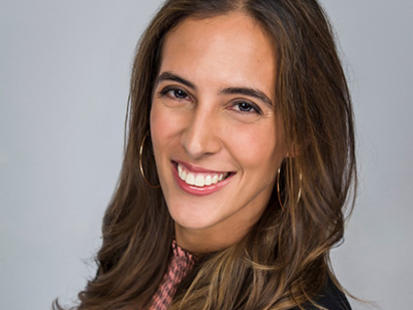
Virginia Covo (MBA '16)
Senior Director of Sustainability, Anheuser-Busch InBev
“I got here in this role by a little bit of luck, mixed in with a lot of other things,” says Virginia Covo (MBA ’16), senior director of sustainability for Anheuser-Busch InBev, the world’s largest brewer.
It may have initially been in a case of “right place, right time,” but Covo has made the role her own. In 2015, under her direction, AB InBev was among the first 100 global companies to set a science-based target for reducing emissions. The company is working toward net zero by 2040.
Though AB InBev “looks for smart and driven people who can jump into new areas and thrive,” Covo says its thanks to a mindset she learned at Darden that she was able to make a big career pivot from sales to sustainability. “I was taking on a challenge where I had no idea about the topic,” she says. “That’s where my education came into play. It gave me confidence to take initiative and go for it.”
A native of Cartagena, Colombia, Covo attended college in Bogota. After college, she spent five years working in sales for The Coca-Cola Co., a “truly transformational experience,” where she was responsible for more than 45% of country’s retail revenue. But it was when she moved to the U.S. in 2014 to attend Darden that she developed a new understanding of collaboration.
“In Darden’s learning teams, I saw a model where you could speak up and refute what was being said in a classroom, but in a respectful way,” she says. “I learned the importance of taking in new information, admitting mistakes, having your mind changed, and seeing positive intent in what someone is offering.”
“The model Darden has [which is] to think about ‘positive intent,’ has stayed with me and been very important,” Covo reflects. When someone offers feedback or debate, “I don’t see it as anyone trying to diminish me.’ I see it as ‘how can this be better? How can we build something together?’”
She uses that approach daily at ABI. Instead of positioning herself as an expert forcing changes onto operational areas, she shares sustainability research, poses questions, and lets teams take the lead in choosing which processes and technologies might actually help their businesses become more efficient. “I consider myself a project manager,” she says. “There are experts in every area of our company—the brewers, the logistics teams, the cooling experts, the drivers. I take the approach, ‘you guys are the experts, here are the goals and let’s work together to get there.’”
For instance, she’ll work with drivers to evaluate the fleet. Does it make sense to buy electric trucks? Maybe not at this moment, given that electric vehicle options today are costlier, heavier and carry less. Should the company consider hydrogen fuel cells? That may be a future possibility.
Some other endeavors are closer to launch. Covo’s particularly excited about a packaging program involving recycled glass, an effort that’s been 18 months in development and will be tested soon. Using recycled glass, rather than firing new glass from raw materials, cuts emissions by more than 30 percent, she says.
Because the field is so complex and fast-changing—climate pressures escalating, technology evolving—she says general management skills are her most valuable weapons in bringing order to chaos.
She credits the strategic thinking and analysis she learned in classes taught by Michael Lenox, Yael Grushka-Cockayne, Elena Loutskina and Melissa Thomas-Hunt.
“You don’t want to narrow your thinking. Any leader needs to be able to think about the bigger picture,” she says. “You have to understand how the entire value chain works and how consumers work, what their attention span is like and their sources of resistance.”
All Darden graduates should care about sustainability, right? Covo’s answer is an immediate Yes. “Our future depends on [everyone] thinking about these things. If we want to design businesses that will be here for the next 100 years, we need to think about what the world will look like and get ready for that,” she says. The questions are big: what raw materials will be available? How will climate-related migration shift population centers? What business models will be viable?
Do such weighty questions feel grim to her? No, she says, equally emphatically. “I feel super energized. I like to solve problems and I feel pretty optimistic about the future. Sustainability is an opportunity to do things better,” she says. “When I first took this role, people did not understand the choice. But now people tell me, ‘what you do is super cool.’ I took the leap of faith and don’t regret pivoting one bit.”